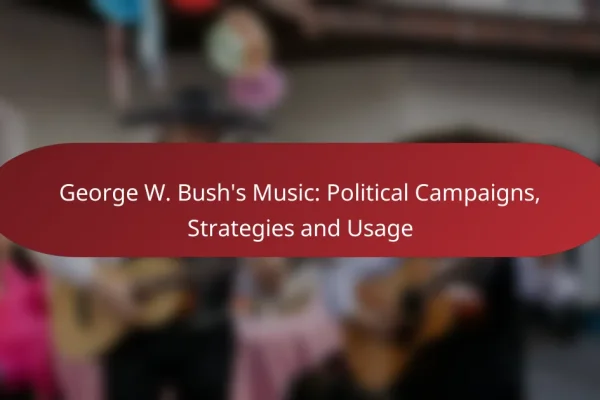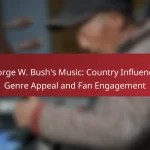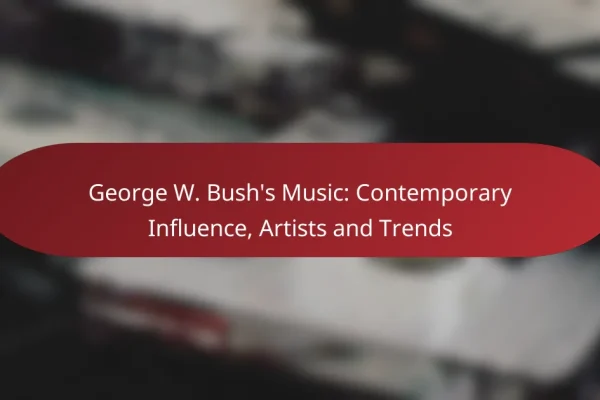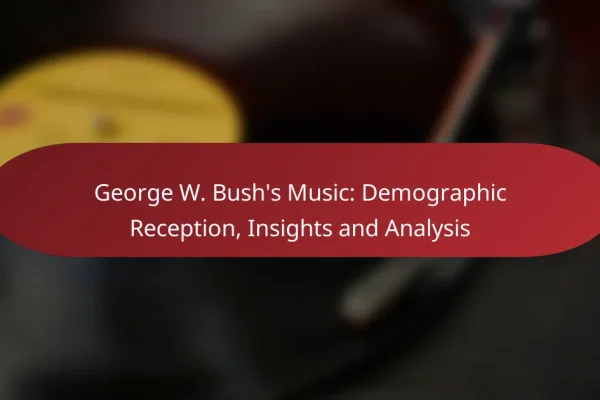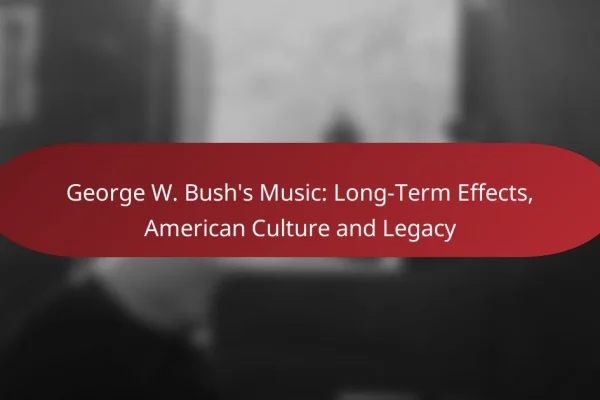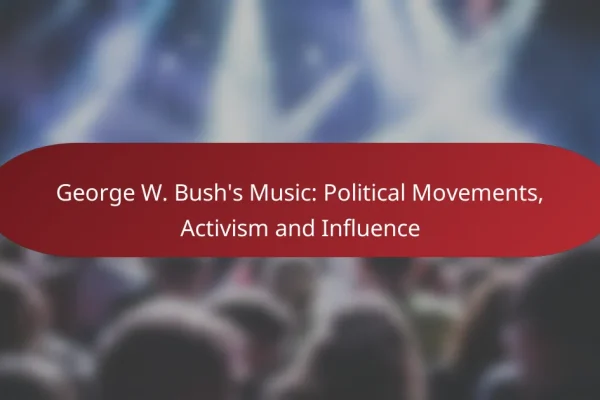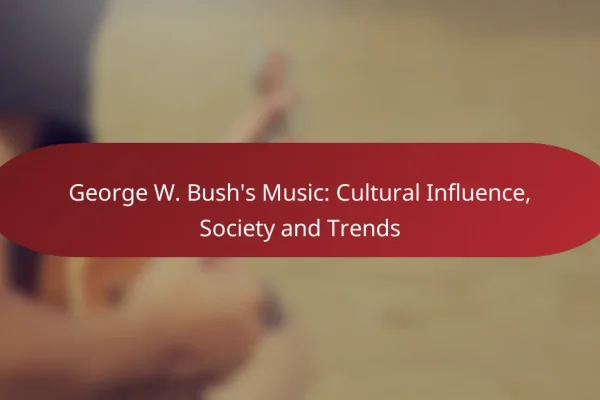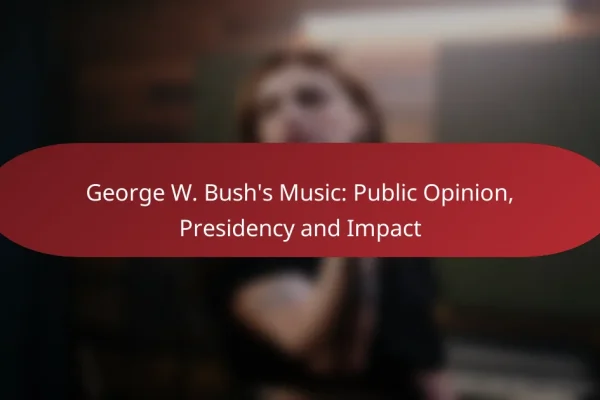How did George W. Bush’s music influence American culture?
George W. Bush’s music significantly influenced American culture by promoting themes of patriotism and connecting with the country music genre. His musical choices during his presidency resonated with many Americans, reflecting national sentiments and values.
Promotion of patriotism
Bush’s music often featured patriotic themes, which helped to foster a sense of national pride during his presidency. Songs like “God Bless the U.S.A.” became anthems at public events, reinforcing feelings of unity and resilience among citizens.
This promotion of patriotism was particularly evident during times of crisis, such as after the September 11 attacks, when music played a crucial role in rallying the nation. The emotional weight of these songs contributed to a collective identity centered around American values.
Impact on political rallies
Music played a vital role in energizing political rallies during Bush’s campaigns. Upbeat and patriotic songs were strategically selected to create an atmosphere of enthusiasm and support among attendees.
For instance, the use of popular country songs helped to connect with rural voters, making rallies more relatable and engaging. This musical backdrop not only entertained but also reinforced Bush’s political messages, making them more memorable.
Connection with country music
George W. Bush’s affinity for country music established a strong connection with a significant segment of the American population. Many of his favorite artists, such as Toby Keith and Alan Jackson, resonated with his political base, enhancing his appeal among country music fans.
This connection was mutually beneficial; country music artists often supported Bush, using their platforms to promote his policies. The blending of politics and country music created a cultural phenomenon that shaped public perception and engagement during his presidency.
What are the key themes in George W. Bush’s music?
George W. Bush’s music often revolves around themes of patriotism, unity, and personal narratives. These themes resonate with listeners, reflecting the sentiments of his presidency and the American spirit during challenging times.
Patriotism and national pride
Patriotism and national pride are central to Bush’s musical expression. His songs frequently celebrate American values, history, and achievements, fostering a sense of belonging among listeners. For instance, tracks that reference iconic American symbols or historical events evoke strong emotional responses and reinforce national identity.
These patriotic themes often serve to unite people during times of crisis, reminding them of shared values and collective strength. Songs that highlight military service or sacrifice can particularly resonate with audiences, creating a bond through shared experiences and respect for those who serve the nation.
Unity and resilience
Unity and resilience emerge as vital themes in Bush’s music, especially during periods of national hardship. His songs often call for solidarity among citizens, encouraging them to come together in the face of adversity. This message is particularly poignant in the aftermath of events like September 11, where music played a role in healing and rallying the nation.
By emphasizing resilience, Bush’s music inspires listeners to persevere through challenges. Lyrics that focus on hope and determination can uplift spirits and motivate individuals to contribute positively to their communities, fostering a culture of support and collective effort.
Personal narratives
Personal narratives in Bush’s music provide insight into his experiences and values. These stories often reflect his journey, struggles, and triumphs, making his music relatable to a wide audience. By sharing personal anecdotes, he connects with listeners on a deeper emotional level, allowing them to see the human side of leadership.
These narratives can also serve as a means of expressing vulnerability, showcasing the importance of authenticity in music. When artists share their personal stories, it can inspire others to reflect on their own lives, creating a sense of community through shared experiences and emotions.
How did George W. Bush’s music affect public perception?
George W. Bush’s music played a significant role in shaping public perception by fostering a connection between his administration and various demographics. His musical choices often reflected his political messages, influencing how people viewed his leadership and policies.
Shift in political engagement
The music associated with George W. Bush’s presidency encouraged a notable shift in political engagement among certain groups. For instance, his use of country and rock music at rallies appealed to conservative voters, prompting increased participation in political events and discussions.
Additionally, the blending of music with political messaging helped to energize grassroots movements, making political engagement feel more accessible and relatable to everyday citizens. This shift was particularly evident during election cycles, where music became a rallying point for supporters.
Influence on younger audiences
Bush’s music choices had a distinct impact on younger audiences, particularly through the use of popular genres that resonated with this demographic. By incorporating contemporary music into his campaigns, he aimed to connect with younger voters, making political issues more relevant to their lives.
However, this approach also sparked a counter-movement, with many young people using music to express dissent against his policies. The interplay between his musical selections and the youth culture of the time highlighted the complexities of political influence in music.
Reactions from critics and supporters
Reactions to Bush’s music varied widely among critics and supporters, reflecting the polarized political climate. Supporters often praised his musical choices as authentic and relatable, reinforcing their loyalty to his administration.
Conversely, critics frequently dismissed his musical preferences as superficial or disconnected from pressing social issues. This division illustrated how music can serve as both a unifying force and a point of contention in political discourse.
What role did music play in George W. Bush’s presidency?
Music played a significant role in George W. Bush’s presidency by serving as a backdrop to political events and a means of communication with the public. It influenced the cultural landscape and shaped perceptions of his administration during key moments.
Soundtrack of political events
During George W. Bush’s presidency, music often accompanied major political events, reinforcing themes and emotions. For instance, songs were selected for campaign rallies, inaugurations, and memorials, creating a powerful atmosphere that resonated with attendees and viewers alike.
Popular tracks from artists like Toby Keith and Bruce Springsteen were frequently used to evoke patriotic sentiments or reflect public sentiment. This strategic use of music helped to frame Bush’s presidency in a specific cultural context.
Music as a tool for communication
Music served as an effective tool for communication during Bush’s presidency, allowing the administration to connect with diverse audiences. By aligning with popular songs and artists, the administration could convey messages that resonated with various demographic groups.
For example, the use of country music appealed to rural voters, while rock and pop songs targeted younger audiences. This approach helped to humanize the president and foster a sense of connection with the public.
Collaboration with artists
George W. Bush’s administration engaged with various artists, reflecting a collaborative approach to music and politics. Notable collaborations included performances at the White House and events that featured prominent musicians, which helped to bridge the gap between politics and popular culture.
These partnerships not only showcased the arts but also allowed artists to express their views on political issues, sometimes leading to public discourse about the administration’s policies. This dynamic interplay highlighted the role of music in shaping political narratives during his presidency.
How does George W. Bush’s music compare to other presidential music?
George W. Bush’s music choices reflect a blend of traditional American values and contemporary influences, distinguishing them from other presidential playlists. His selections often aimed to resonate with a broad audience, emphasizing country and classic rock genres that appealed to many Americans.
Comparison with Barack Obama’s playlist
Barack Obama’s playlist is known for its eclectic mix, featuring genres like hip-hop, R&B, and classic rock, which contrasts with Bush’s more traditional selections. While Bush leaned towards country and classic rock, Obama showcased a diverse range of artists, including contemporary names and classic legends, appealing to younger demographics.
Obama’s musical choices often included songs that addressed social issues, reflecting his administration’s focus on inclusivity and progress. This difference highlights how each president’s music preferences align with their political messaging and audience engagement strategies.
Contrast with Bill Clinton’s musical choices
Bill Clinton’s musical tastes were heavily influenced by jazz and blues, showcasing his Southern roots and cultural appreciation. In contrast, Bush’s selections favored country and classic rock, which aimed to connect with mainstream American values and sentiments.
Clinton famously played the saxophone, which added a personal touch to his musical identity, while Bush’s music choices were more about creating a relatable image for the average American. This divergence illustrates how each president used music to shape their public persona and connect with different segments of the population.
Influence of Ronald Reagan’s music
Ronald Reagan’s music choices often reflected his Hollywood background, favoring classic American songs that evoked nostalgia. Bush’s music, while also rooted in Americana, leaned more towards country, which became a staple in his public image and campaign events.
Reagan’s era emphasized optimism and patriotism through music, a theme that Bush continued but with a different genre focus. Both presidents used music to foster a sense of national pride, yet their genre preferences highlight the evolving landscape of American musical tastes across different political eras.
